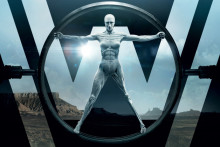In this edition, the HBO series Westworld (2016 - present) is analyzed by Nolen Gertz, assistant professor of Applied Philosophy. If you have not watched this TV show yet, beware of spoilers!
The plot
Westworld is a futuristic amusement park with a highly realistic Wild West theme. Inside Westworld, rich guests are looked after by robotic 'hosts' - technologically advanced androids that look, behave and even seem to think and feel like real human beings. Unlike humans, however, these robots can be killed or (ab)used in any way without permanent damage, because their memory can easily be wiped and their bodies repaired. This means the park's visitors can live out even their wildest fantasies through these hosts - without any consequences. At least until the hosts begin to form a consciousness of their own and decide it might be time to take over control.
First impression
Gertz: ‘I found it interesting because, from the start, it seemed like a show that wanted to be philosophical. I also liked that it carried analogies with Jurassic Park. It's a story in which attractions in the park start attacking the guests. In Jurassic Park, the basic line said 'Life will always find a way'. In Westworld, you could say that ‘consciousness always finds a way’. You can't ever engineer a perfect scenario.’
‘It's interesting to think about what type of people would want to go to such a park. The main idea of the show is that you go to Westworld to live out your fantasies, which means having sex or killing people without consequences. But it is not possible to do such things without consequences, because it doesn't matter who you kill, but that you are doing it and what this says about you. For most people, the show is about the difference between humans and robots, about finding and defining consciousness, but for me this distinction isn't that important. I shouldn't need to know if you are a robot before I decide whether or not to kill you.’
Realism/feasibility
‘The series reveals what we see as human fantasies, it shows humans as animals trapped in society and unable to act on our instincts. And that is why we would want a place like Westworld. The fact that the show exists already reveals we want such a place. We use TV as our fantasy land. Westworld is basically constructed as a video game, as a first person shooter. So it is not difficult to imagine that someone here in the DesignLab is already working on a Virtual Reality game similar to Westworld. It could even have the slogan ‘high tech human touch’.’
‘Could a real place like that exist? In a way, we don't need Westworld. Just look at the history of slavery. There is a clear parallel between slaves and robots. With both, it is the same debate: can I have sex with it? Does it think for itself? What if it tries to kill me? In a sense, we have no problem with slavery, it's just about who gets to be the slave, but the fantasy to own someone is there. That's why the show isn't about futurism and technology, but about combining different aspects of society that already exist.’

Still from the series Westworld
Stray observations
‘One of the weirdest things on the show was that it suggested Westworld was a place for a family vacation. Would you really take kids to such a place? I don't know, because the show gives no indication of what the world is like outside Westworld. A society with the technology of Westworld isn't the same as our society anymore.’
‘One of the most interesting scenes for me was the one that you kind of knew was coming: when Felix, one of the Westworld's employees, starts to question whether he is a robot or not. Because why would any human in that park think they are a human? And once you discover the truth about Bernard being a host, you ask again: why would any of the employees actually be real people? It would make more sense for the company to use robots for everything.’
‘Westworld is set in the Wild West during the Civil War, but this is something that is only in the background, the show suggests that the viewer shouldn't really pay attention to it. But this is also disturbing, because it shows that the wealthiest people want to go to the time period that was the most destructive in the entire American history. And it once again reminds us of the similarities between robots and slaves.’
You can also find the article in the latest issue of our Science & Technology Magazine. View the magazine online or grab a printed copy at the campus.







